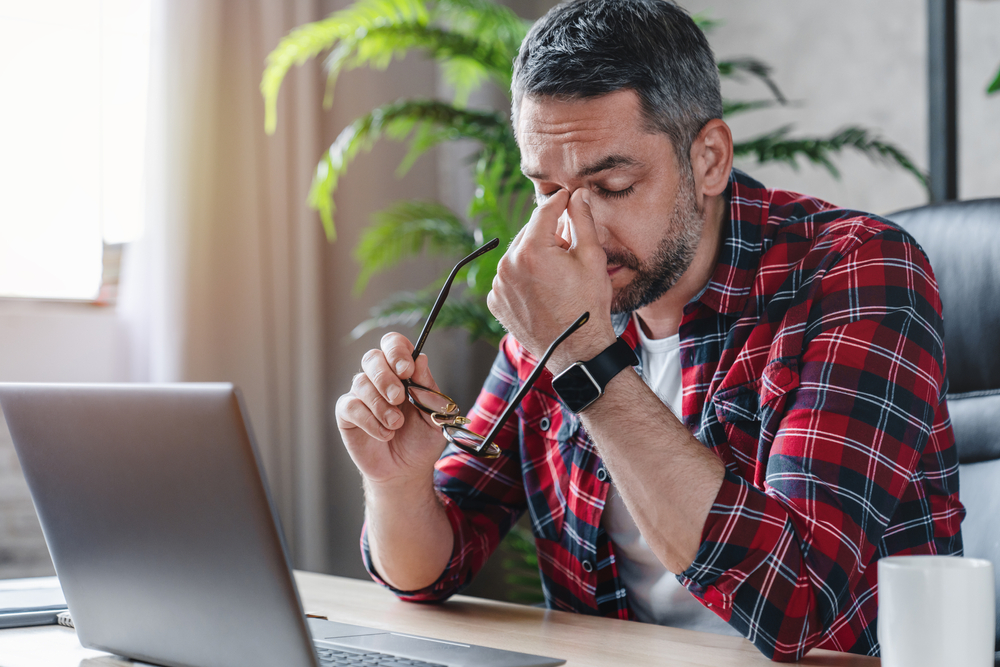Can I Prevent Floaters from Occurring as I Age?
October 3, 2024
If you are getting older, you may wonder if there are ways to prevent floaters from occurring as you age. While it’s not always possible to completely prevent floaters, there are things that you can do to maintain overall eye health and possibly minimize their occurrence.
Keep reading to learn more about floaters and what steps you can take to minimize them as you age!
What Are Floaters?
 Floaters are tiny specks that appear to “float” in your central field of vision. They can look like dark gray or black spots, circles, squiggly lines, thread-like strands, rings, or cobwebs.
Floaters are tiny specks that appear to “float” in your central field of vision. They can look like dark gray or black spots, circles, squiggly lines, thread-like strands, rings, or cobwebs.
Floaters occur when the jelly-like substance in your eye, the vitreous, liquifies and contracts, causing the formation of scattered clumps of collagen fibers. Floaters are the tiny shadows these clumps cast onto the retina.
Floaters are most noticeable in bright sunlight or when you are looking at a white background. They may appear as if they are drifting around in your eye, shifting as your gaze shifts.
While floaters are usually harmless, if you experience a sudden onset of many floaters at once, it could be a sign of a more serious eye condition, like a retinal tear or detachment. This is especially true if they are accompanied by flashes of light or other changes in your vision.
If you experience any of these symptoms, make sure to see your eye doctor right away for evaluation.
What Are The Most Common Causes of Floaters?
There are many reasons why floaters can occur. Although not all floaters mean that something serious is happening to your vision, it's still best to have your eye doctor examine your eyes if you notice any new ones.
Some of the most common causes of floaters are:
Posterior Vitreous Detachment
In most cases, the occurrence of floaters is age-related. As you age, the vitreous slowly shrinks and separates from the retina, causing posterior vitreous detachment (PVD).
PVD is most often seen in adults over the age of sixty-five, though it can affect the vision of people as young as forty. In most cases, PVD does not require treatments and does not cause lasting vision impairment.
Retinal Detachment
Retinal detachment happens when the retina is pulled away from its position at the back of the eye. If the retina becomes detached, it is no longer supported by the retinal blood vessels and can cause permanent vision loss.
Over a long period of time, PVD can cause retinal detachment. If you are experiencing floaters, it is important to have your eyes checked regularly to prevent PVD from leading to more serious retinal detachment.
Retinal detachment can also be caused by other eye conditions including diabetic retinopathy, age-related macular degeneration, and eye tumors.
Other Causes of Floaters
Temporary floaters can be caused by less serious eye conditions, including inflammation, infections, minor injuries, and even severe bouts of coughing.
How Are Floaters Treated?
If floaters are occurring due to age-related PVD or another cause that is not inherently harmful to your vision, often the only treatment is time. Over time, the brain learns to ignore floaters and no longer registers their presence in your field of vision.
In rare cases, floaters can be treated and removed with a surgical procedure called a vitrectomy. During this procedure, an eye surgeon removes some or all of the vitreous and replaces it with either a saline solution or a bubble made of gas or oil.
For floaters caused by another eye condition, like a retinal detachment, effective treatment of the underlying condition will be most important to preserve vision.
Can You Prevent Floaters?
While there are things you can do to make floaters feel less noticeable or temporarily disappear, there is no proven way to prevent them from occurring as you age. If annoying floaters are bothering you, you can try:
Moving Your Eyes
Moving your eyes can shift the fluid, and the floaters, away from your central field of vision. Looking up and down is usually more effective than looking from side to side.
Manage Eye Strain
Floaters can seem worse if your eyes are tired or sore. You can protect your eyes from strain by practicing healthy screen habits and moistening your eyes with artificial tears.
Eat a Well-Balanced Diet
 Foods like leafy greens, oily fish, and vitamin-A-rich carrots contain nutrients that promote eye health as you age. Keeping your eyes healthy can help prevent common age-related eye conditions that can cause floaters.
Foods like leafy greens, oily fish, and vitamin-A-rich carrots contain nutrients that promote eye health as you age. Keeping your eyes healthy can help prevent common age-related eye conditions that can cause floaters.
Quit Smoking
Smoking affects blood circulation in the eye and may contribute to the presence of floaters. Quitting smoking is good for your eyes and your overall health.
Protect Your Eyes From UV Light
Exposure to UV light can lead to the formation of eye-damaging free radicals. Protect your eyes by wearing sunglasses that block 100% of UV light.
Get Annual Comprehensive Eye Exams
When you schedule annual comprehensive eye exams, you can ensure that eye conditions that cause floaters are diagnosed and treated early.
While it is not entirely possible to prevent floaters from occurring as you age, there are things you can do to maintain your overall eye health and minimize their impact on your vision. Floaters are a natural part of the aging process for many people, so understanding their causes and taking preventive measures can help keep floaters at bay.
Do you want to learn more about floaters or determine what might be causing yours? Schedule an appointment at Chesapeake Eye Care & Laser Center in Annapolis or Easton, MD, today!



